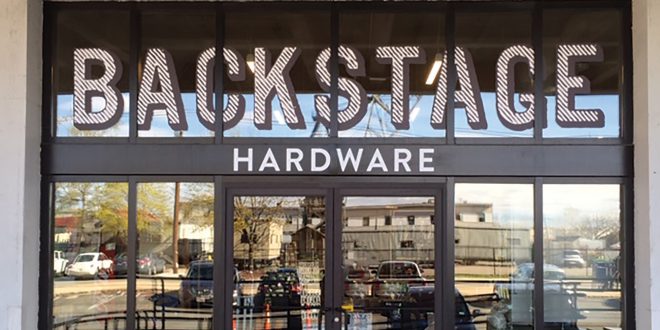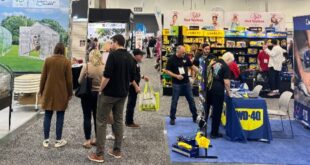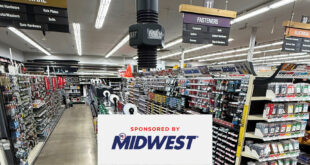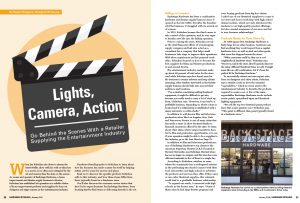
Click the picture to download a PDF of this story.
By Renee Changnon, rchangnon@nrha.org.
Lights, Camera, Action
When Jim Robichau sits down to stream the latest Netflix show with his wife or takes her to a movie, he is often more intrigued by the set and scenery than the stars on the screen.
As owner and operator of Backstage Hardware, a home improvement and theater supply business in Boston, Robichau has established his operation as a reliable dealer of home improvement products and supplies for busy set designers and stage runners in the entertainment industry.
Hardware Retailing spoke to Robichau to learn about how his business has made a name for itself by helping artists set the scene for movies and plays.
Read on to discover the specific products Robichau sells to this industry, and how these items differ from those typically found in a hardware store.
You’ll also discover the customer service tactics that have led to repeat business for Backstage Hardware, from locating hard-to-find items or delivering directly to the set.
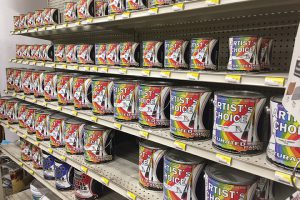
Selling on Location
Backstage Hardware has been a combination hardware and theater supply business since it opened in the late 1980s. But after the founders sold the business, it struggled with its second set of owners.
In 2013, Robichau became the third owner to take control of the operation, and he was eager to breathe new life into the failing operation.
Prior to owning the store, Robichau served as the chief financial officer of a landscaping supply company and had also acted as a consultant for a company that helps small businesses take steps to improve their operations. With these experiences and his personal work ethic, Robichau focused on how to become the best supplier for films and theater productions in and around Boston.
His entertainment industry customers make up about 40 percent of total sales for the store. And while Robichau says he’s found ways for the business to remain relevant and keep clients returning, other retailers interested in the theater supply business should take into account their audiences and locations.
“For a retailer considering selling theatrical equipment, it might be difficult to get into, because you really need to carry a lot of stock up front,” Robichau says. “However, it can lead to a profitable business, depending on where a store is located and if a relationship is established with a major university or a film studio.”
In addition to well-known film and television production cities like Los Angeles, New York and Vancouver, Boston is one of many cities that has made a name in show business thanks to financial incentives offered by the state. To learn about other states where unique incentives have led to film and production opportunities or to see if your operation might be able to be a supplier to the industry, go to the Last Word on Page 78.
In addition to film and television productions, one of Backstage Hardware’s top clients is the American Repertory Theater (A.R.T.) located at Harvard University, says Robichau. Harvard alone has seven stages on campus, and the store has even delivered materials to five of them in a single day.
According to Robichau, retailers in areas where the community has a widespread interest in the performing arts should connect with their local universities and high schools to advertise the products and services they offer. If they carry or can order theatrical supplies, this outreach could lead to a profitable business relationship.
“To expand our reach, I connected with high schools in the Boston area,” he says. “Some of these schools had large theater programs and were buying products from big-box chains. I asked one of our theatrical suppliers to come to our store and host a workshop with high school drama teachers, which not only introduced the teachers to our high-quality product offerings, but also created awareness of our store and led to new business relationships.”

Products Ready for Their Close-Up
At 5,000 square feet, Backstage Hardware is fairly large for an urban location. Customers can find anything they would expect from a regular hardware store, as well as steel and other goods that serve the shipyard across the street.
“When customers walk by, they see a cool neighborhood hardware store,” Robichau says. “However, inside the store, they’ll quickly discover the many different theatrical items we sell. It might seem like an odd combination, but it’s been the perfect fit for Backstage Hardware.”
To successfully attract and earn repeat sales from set designers and other artists, Robichau says a retailer needs to have the essential “expendables,” which is a term used in the entertainment industry to describe the products required to create a set. A few of the main expendables Backstage Hardware stocks include scenic paints, specialized tapes and theatrical lighting equipment.
“We sell the top two theatrical paint product lines that scenic painters use,” Robichau says. “This paint is different than paint typically found at a hardware store.”
“Unlike house paints, which reflect light, scenic paints have a completely matte finish. Also, the pigments in this type of paint are pure, so it can be thinned out to tint things,” he says.
In order to stand out against other theatrical supply businesses and online competitors, Robichau stresses the importance of having multiple brands of scenic paint, because he says creative professionals who utilize this paint often have very specific brand demands.
Additional paint supplies to go along with these paints include artist brushes, buckets, strainers, vinyl and latex gloves and aprons.
Robichau says his customers often add additional scenic supplies to their order, like flameproofing products, sandbags, or a nontoxic composite fabricating resin used to create various props and set constructions.
Another product that Backstage Hardware sells in large quantities to set designers is gaffer tape. While it is similar to duct tape, those working in theater or television production prefer to use it because it is more resistant to heat and is easily removed without damaging the surface it was adhered to.
“Most of my entertainment industry clients require gaffer tape, and they buy it in a wide range of colors and widths for different purposes,” Robichau says. “They use different colored tapes to mark where actors will stand on stage or to keep cords and carpets secured for safety or concealment.”
Another theatrical category Backstage Hardware is well stocked in is specialized lighting products. Many of these items wouldn’t be found in a typical lighting department of a hardware store, but it’s something Robichau knows he needs to have to compete with businesses that exclusively sell expendables to the industry.
An example of one such lighting product is gels, also known as color filters. Color filters come in a variety of styles but are used by set designers and light designers to add color directly to a set.
With bright lights comes the need to cool items in the glow of the heat, so Backstage Hardware also has a range of protective filters that extend the life of expensive color filters.
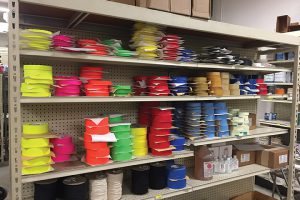
Focusing on Customer Service
Just as customer service is important for the walk-in DIYer, it is equally crucial for generating repeat business within the entertainment industry, Robichau says. However, the type of service provided is less focused on educating and more focused on meeting their demands quickly and efficiently.
“When a movie or television crew sets up for production, they bring a tractor trailer full of expendables,” he says. “Yet no matter how much they buy and stock up on, there are often changes and new items they need—that’s where Backstage Hardware comes into play.”
According to Robichau, the expendables Backstage Hardware carries must be fully stocked, otherwise he could easily lose sales to a competitor. However, some items have to be special ordered, and that’s when going above and beyond to get what a customer needs can pay off, he says.
“A few years ago, during the filming of a major motion picture, I got a request for high-quality studio chain, which is a type of steel chain,” Robichau says. “I told them I had a few 100-foot boxes, but they said they needed 1,000-foot barrels of studio chain. I called my supplier and shocked him by ordering three barrels, which equates to 14,000 feet of chain. In my experience, if you come through and can handle major requests like this quickly, your customers will be sure to continue doing business with you.”
And while finding a way to handle some of the odd requests might seem stressful, Robichau says this is where Backstage Hardware shines.
“If I wasn’t willing to go the extra mile and find the items they need, I wouldn’t serve this industry,” he says. “I enjoy the challenge of getting customers hard-to-locate items. It drives big sales for my business as well.”
According to Robichau, most film projects can earn his business a sizeable profit, anywhere from $2,500 to $10,000, depending on the size of the project, length of time they’re in town and their production needs. The biggest business he did was when the 2016 “Ghostbusters” movie was filming in Boston, contributing $50,000 to the operation’s sales in the course of a summer.
With about six years of experience serving the entertainment industry, Robichau says most of his business comes from repeat customers, and others who have heard of his company through word-of-mouth recommendations, even leading to sales outside the state.
“There aren’t many retail stores that production teams can turn to in a bind,” Robichau says. “Because of our reputation, we’ve even had our business sought out by groups filming outside Boston. In fact, when a Netflix series called “Mindhunter” was filming in Philadelphia, the head of their scenic department reached out to me and asked us to deliver products to them.”
Whether someone comes to the store to pick up an order or Robichau gets in his truck and delivers right to the set, he admires the work that is created with the products he sells.
“The people in the film industry are very impressive artists and builders,” Robichau says. “I always find it so interesting when I get to deliver to the set and see what they’re making before it’s on screen. It’s cool to know Backstage Hardware played a role in the creation of a show.”
 Hardware Retailing The Industry's Source for Insights and Information
Hardware Retailing The Industry's Source for Insights and Information



